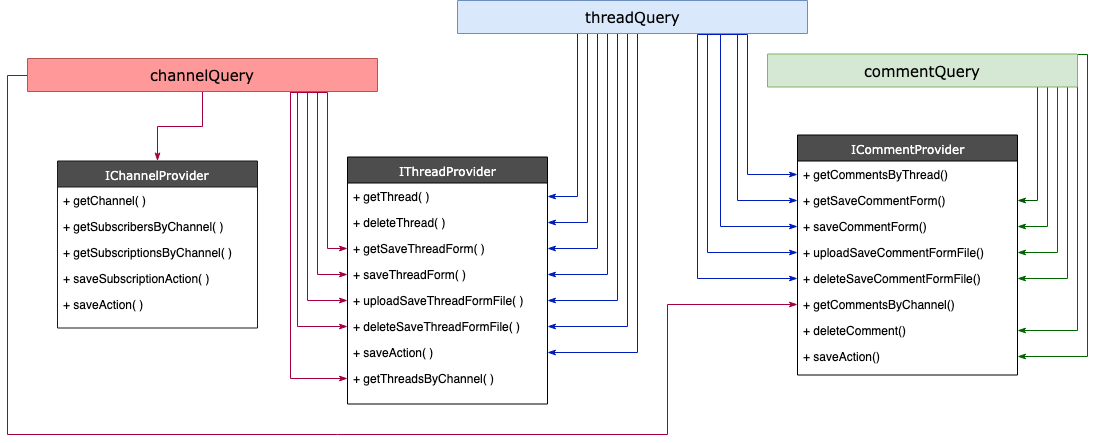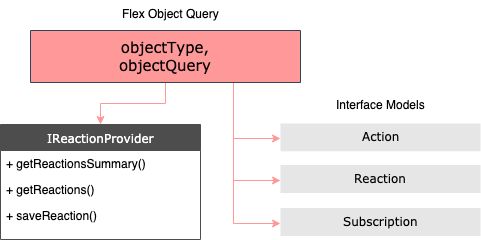Core Concepts
Data Flow
Object Queries
As one of the most important features of the yack-connector-framework, the object query partial is how we pass and share data between providers. These object queries are just plain javascript objects.
Core Queries
While the general flow of data for the key object queries goes IChannelProvider → IThreadProvider → ICommentProvider, the diagram below helps to visualize which query objects key providers’ functions inherit. 
Flex Queries
Flex Queries allow providers and interfaces to easily access multiple types of Core Query objects conditionally. All Flex Query objects have two properties where the objectType flags what type of core objectQuery to expect.
objectTypeobjectQuery- one of the sixCore Queries
The below diagram depicts which providers and interfaces make use of Flex Queries. 
Providers/interfaces that accept Flex Queries and their corresponding objectTypes:
Example: Search
Example: Form
Important Notes
ℹ All object queries include a flexible metadata property. See Metadata
ℹ Not all references to objectTypes in the yack-connector-framework have an associated objectQuery. See Non-Query objectTypes
Metadata
If the returned response data from a Connector source does not fit perfectly into the interface and you find yourself needing this data at some later point, then you should store this data in the metadata object. The metadata will be available in the object query. See Object Queries for a full list of object queries mapped to their corresponding interfaces to better understand the flow of data.
Authentication
OAuth
DO THIS
Replies
The yack-connector-framework does not have a separate interface for replies. The app is able to distinguish that a given comment is a reply by setting the parentCommentId property on the Comment model.
✎ Example 1: Set Comment As A Reply
// Here we're selecting 2nd comment from the response data
const selectComment = response.data[3];
// Check if function was passed a parentCommentId
const parentCommentId = !!parentCommentQuery ? parentCommentQuery.id : null;
// Populate comment
const comment: Comment = {
id: selectComment.id.toString(), // id = 3
content: {
type: TextContent.Types.html,
value: $body.html()
},
utcCreateDate: selectComment.created,
createdBy: {
id: selectComment.user.id,
username: selectComment.user.username
},
threadId: threadQuery.id,
};
// Setting parent Id
if(parentCommentId){
// if were already given a parent id set it on the comment object
populatedComment.parentCommentId = parentCommentId;
}else if("reply_to_comment_id" in selectComment){
// Check if response comment's data has a parent comment id
populatedComment.parentCommentId = comment.reply_to_comment_id.toString();
}else{
// Is top-level comment
}
Pagination
Channels
Threads
Comments
The first time that the getCommentsByThread() is called the options.nextPageToken and parentCommentQuery will be undefined because they are only used for fetching the next page of comments/replies.
✎ Example 1: Checking if Paginated
↳ ICommentProvider.getCommentsByThread()
If is provided a nextPageToken property on its options argument, then you know the function was called because the app is trying to fetch the next page of comments.
let paginated: boolean = !!options.nextPageToken;
✎ Example 2: Checking if Paginated Replies or Paginated Top-Level Comments
↳ ICommentProvider.getCommentsByThread()
All functions in the ICommentProvider are optionally and conditionally provided a parentCommentQuery property. If this property is provided, then the comment is a reply. Otherwise, it’s a top-level comment.
let paginated: boolean = !!options.nextPageToken;
const parentCommentId = !!parentCommentQuery ? parentCommentQuery.id : null;
if(paginated && !parentCommentId){
// App triggers getCommentsByThread() when the user reaches the end of the comments list.
console.log("Fetch next page of top-level comments")
}else if(paginated && parentCommentId){
// App triggers getCommentsByThread() for replies when user clicks the __Load X More Replies__ link.
console.log("Fetch next page of replies")
✎ Example 3: Setting Comment NextPageToken
↳ ICommentProvider.getCommentsByThread()
const comments = new PagedArray<Comment>();
for(const comment in response.data){
const populatedComment = populateComment(comment);
comments.push(populatedComment);
}
// If the comments list has a next page set it
"nextToken" in response.data ? comments.nextPageToken = response.data.nextToken : null;
return Result.success(comments)
✎ Example 4: Setting repliesNextPageToken
↳ ICommentProvider.getCommentsByThread()
for(const comment in response.data){
const populatedComment = populateComment(comment);
if(comment.has_more_replies){
comment.repliesNextPageToken = comment.replies_token;
}
comments.push(populatedComment);
}
File Uploads
Error Handling
Configs
User Sessions
The SessionContainer is where cookies and requestHeaders are stored locally within the context of the Connector’s PluginSession instance. The session container is passed to provider interfaces through the options parameter of type PluginRequestOptions.
↳ Hierarchy: IPlugin.basicAuthClient → IBasicAuthClient.loginUser → PluginRequestOptions.session → PluginSession.sessionContainer
✎ Example 1: Get Session Info
export class UserProvider implements IUserProvider {
async getSelf(options: PluginRequestOptions): Promise<Result<PluginUser>> {
const sessionContainer = options.session.sessionContainer;
const sessionCookies = sessionContainer.cookies,
sessionHeaders = sessionContainer.requestHeaders,
sessionMetadata = sessionContainer.metadata;
}
}
✎ Example 2: Set Session Info
export class BasicAuthClient implements IBasicAuthClient {
async loginUser(response: BasicAuthResponse): Promise<Result<SessionContainer>> {
const loginObj = {
cookies: response.sessionCookies,
metadata: null,
requestHeaders: null
};
return Result.success(loginObj);
}
}
ℹ Not to be confused with PluginSession
ℹ Only useful for Yack Connectors that use BasicAuth
ℹ Locally stored session information is inaccessible from Chrome DevTools.
Request Options
Table of contents
- Authentication
- Configs
- Error Handling
- File Uploads
- Pagination
- Replies
- Sessions
- Data Flow
- ObjectTypes
